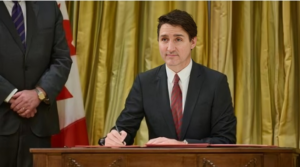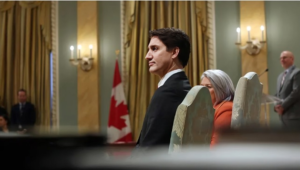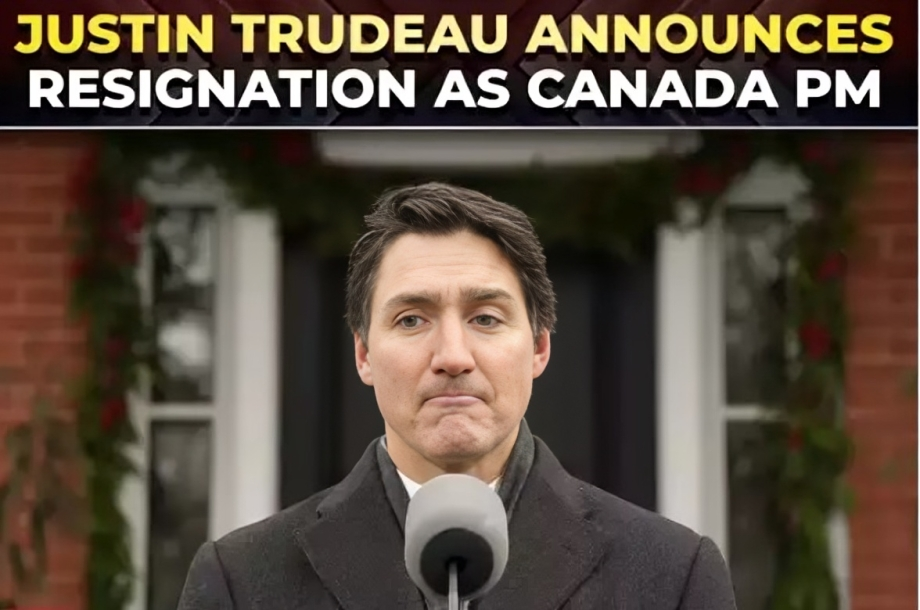Canadian Prime Minister Justin Trudeau has announced his resignation. He ends his nine-year tenure as leader, in response to mounting pressure from his party.
Trudeau declared that parliament in would be prorogued, or suspended, until March 24. Further, he would remain in office until his Liberal Party selects a new leader.
After almost ten years in office, Canadian Prime Minister Justin Trudeau announced his resignation on January 6, 2025. He declared that Parliament would be adjourned until March 24, 2025, to allow for the leadership race.
Concerned about his leadership, 24 Liberal MPs signed a letter in October 2024 calling for his resignation. Furthermore, Trudeau was under more pressure to resign after Finance Minister Chrystia Freeland abruptly resigned in December 2024.
“This country deserves a real choice in the next election, and it has become clear to me that if I’m having to fight internal battles, I cannot be the best option in that election,” he said during a press conference on Monday.
The End of The Trudeau Era
Heralded as the new face of progressive politics, Trudeau came to power almost ten years ago. Pierre Trudeau, who dominated Canadian politics in the 1970s and 1980s, is the father of Canada’s former prime minister Justin Trudeau. As the son of Prime Minister Pierre Trudeau, Justin Trudeau had a unique connection with Canadians, whom they had known since his birth. He got his father’s former job because of their bond. His young charm and upbeat political agenda won over voters in 2015, catapulting the Liberals from third place to a majority of parliamentary seats- unprecedented in Canadian political history.

At 53, Justin Trudeau remains the G7’s longest-serving leader. Also, he is the only leader still in office among his peers, including Angela Merkel, David Cameron, Shinzo Abe, and Barack Obama. Trudeau was quick to highlight his accomplishments in his speech on Monday. He highlighted renegotiating a free trade agreement with the previous Trump administration. So this managed the disastrous and turbulent COVID pandemic, and enacting a child benefit widely seen as reducing poverty.
His party lost its majority in a 2019 general election. This forced the Liberals to depend on the help of other parties to maintain their hold on power. In 2021, a sudden election did not help their situation. He had a beautiful time in his tenure. Further, he gained support for raising taxes on the wealthy, lowering taxes on the middle class, and eliminating child poverty. He was briefly “a global media darling”.
Moreover, he help improve the lives of Indigenous Canadians, whose challenging living conditions continue to be a source of national shame and implemented a carbon tax to reduce emissions.
Also Read : Hulk Hogan Booed Heavily on Netflix’s ‘Monday Night Raw’
What caused Justin Trudeau to step down?
However, since his rise to prominence on the international scene and two general elections, Trudeau and his reputation have compromised the party’s chances. He has been under pressure to quit for months, amid poor approval ratings and weakened support within his party.
Recently, Canadian political journalist Paul Wells, author of Justin Trudeau on the Ropes, told the BBC that he thinks Trudeau will be remembered “as a consequential” prime minister, particularly for showing true leadership on issues like climate policy, and to some extent, indigenous reconciliation. But he is also the person “who felt increasingly out of touch with public opinion and was unable to adjust to changing times”.

More recently, Trudeau has had to contend with inflation and rising living expenses, which have fueled political upsets globally. The nation showed frustration with his management of immigration and other issues. Further, his perceived inability to fulfill lofty promises and their “overfilled, overstuffed” agenda.
The Liberals drastically reduced the number of newcomers permissible in Canada at the end of last year after reconsidering their aggressive immigration goals due to worries that the matter was poorly handled. He is one of Canada’s longest-serving prime ministers, having been in office for more than nine years. Further, his administration showed a sense of exhaustion and dissatisfaction. His party members started openly expressing their disapproval of his leadership. Hence, the final domino fell.
What is the next step?
Although October is the deadline for Canada’s next general election, there will be a poll probably sooner rather than later. The official opposition Conservative Party has a double-digit lead in opinion polls. They have been trying for months to call an election by introducing several no-confidence votes in the House of Commons.
In a no-confidence vote, the government must have the support of the majority of the 338 members of parliament. The Liberals need the support of members of Canada’s other parties because they are 17 seats short of that. Trudeau has so far received enough support from members of the left-leaning New Democratic Party (NDP) to hold onto power.
As Justin Trudeau has stepped down, his party must now find a new leader to compete in the general election. Some of the personalities expected to enter the Liberal leadership race are: Former Deputy PM, Chrystia Freeland, Former central banker, Mark Carney, Anita Anand – transport minister, Francoise-Philippe Champagne – minister of innovation, science and industry, Melanie Joly – the minister of foreign affairs and a former provincial premier – Christy Clark.

